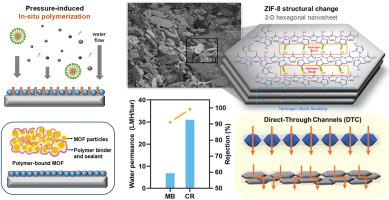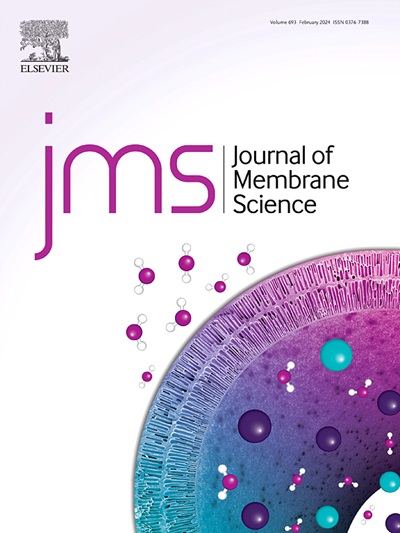Direct-through channels of ZIF-8 composite membranes via in-situ PolyBMA sealing: Radical-induced phase transformation and dye removal efficiency
IF 8.4
1区 工程技术
Q1 ENGINEERING, CHEMICAL
引用次数: 0
Abstract
Metal-organic frameworks (MOFs)-based hybrid composite membranes are promising candidates for achieving highly efficient water purification. In this study, a facile, novel pressure-induced filtration method involving in-situ polymerization of butyl methacrylate (BMA) was proposed for sealing ZIF-8 nanoparticles on top of polyethersulfone (PES) ultrafiltration membrane support. The developed (ZIF-8+polyBMA)/PES composite membranes with thin toplayers of <1 μm present attractive water permeance (up to 31 LMH/bar) and good rejection of Congo red (99.2 %) and Methylene blue (99.1 %). The ZIF-8 particles served as direct-through channels with superior separation performance due to their high porosity and tunable pore structure, while the interstices were successfully sealed with polyBMA by in-situ polymerization, as demonstrated by SEM and dye removal experiments. It was found that the morphology of ZIF-8 transformed from a rhombic dodecahedron to two-dimensional hexagonal nanosheets during the fabrication process. We hypothesize that this surprising phenomenon is caused by the reaction of the initiators (Na2S2O5 and K2S2O8) that generate the hydroxyl and sulfate radicals attacking and transforming the Zn-MIM bond network of ZIF-8. However, insights into the structural changes need to be further investigated to understand the mechanism involved.

通过原位 PolyBMA 密封实现 ZIF-8 复合膜的直通通道:辐射诱导的相变和染料去除效率
基于金属有机框架(MOFs)的混合复合膜是实现高效水净化的理想候选材料。本研究提出了一种简便、新颖的压力诱导过滤方法,该方法涉及甲基丙烯酸丁酯(BMA)的原位聚合,用于将 ZIF-8 纳米颗粒密封在聚醚砜(PES)超滤膜支架之上。所开发的(ZIF-8+聚 BMA)/聚醚砜复合膜具有 1 μm 薄的表层,透水性极佳(高达 31 LMH/bar),对刚果红(99.2%)和亚甲蓝(99.1%)有良好的抑制作用。ZIF-8 颗粒具有高孔隙率和可调节的孔隙结构,因此可用作具有优异分离性能的直通通道,同时通过原位聚合,成功地用聚 BMA 封住了间隙,这一点已在扫描电镜和染料去除实验中得到证实。我们发现,在制造过程中,ZIF-8 的形态从菱形十二面体转变为二维六边形纳米片。我们推测这一令人惊讶的现象是由引发剂(Na2S2O5 和 K2S2O8)的反应引起的,引发剂产生的羟基和硫酸根自由基攻击并改变了 ZIF-8 的 Zn-MIM 键网络。不过,要深入了解结构变化的机理,还需要进一步研究。
本文章由计算机程序翻译,如有差异,请以英文原文为准。
求助全文
约1分钟内获得全文
求助全文
来源期刊

Journal of Membrane Science
工程技术-高分子科学
CiteScore
17.10
自引率
17.90%
发文量
1031
审稿时长
2.5 months
期刊介绍:
The Journal of Membrane Science is a publication that focuses on membrane systems and is aimed at academic and industrial chemists, chemical engineers, materials scientists, and membranologists. It publishes original research and reviews on various aspects of membrane transport, membrane formation/structure, fouling, module/process design, and processes/applications. The journal primarily focuses on the structure, function, and performance of non-biological membranes but also includes papers that relate to biological membranes. The Journal of Membrane Science publishes Full Text Papers, State-of-the-Art Reviews, Letters to the Editor, and Perspectives.
 求助内容:
求助内容: 应助结果提醒方式:
应助结果提醒方式:


